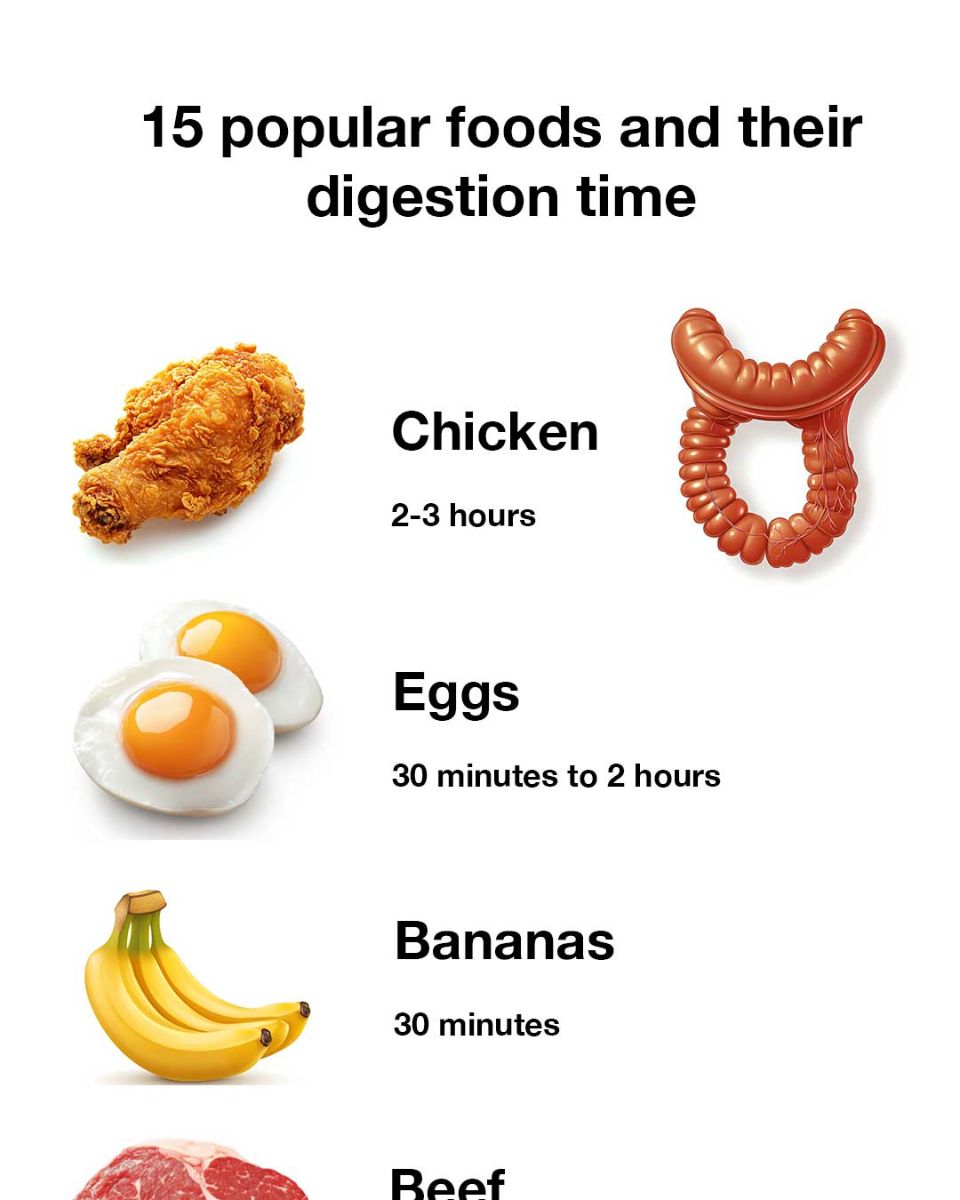15 popular foods and their digestion time
Holly Owens
Contributing Writer
Print this recipe
Digestion is a complex process that varies significantly depending on the type of food consumed. Understanding the digestion time of various foods can help individuals make informed dietary choices that promote better health and well-being. This article explores 15 popular foods and their digestion times, providing insights into how quickly or slowly these foods are broken down in the body. By understanding these differences, you can tailor your diet to suit your digestive needs, ensuring that you feel energized and satisfied throughout the day.
Understanding the Digestive Process
The digestive process begins in the mouth, where food is chewed and mixed with saliva to form a bolus. This bolus then travels down the esophagus to the stomach, where it is further broken down by stomach acids. The partially digested food moves into the small intestine, where nutrients are absorbed into the bloodstream. Finally, the remaining waste products are passed into the large intestine and eventually excreted. The entire process can take anywhere from a few hours to several days, depending on the type of food consumed and individual digestive health.
Factors Influencing Digestion Time
Several factors influence how quickly or slowly food is digested. These include the macronutrient composition of the food (carbohydrates, proteins, and fats), the presence of fiber, the individual’s metabolic rate, and overall digestive health. For example, high-fiber foods tend to slow down digestion, while simple carbohydrates are digested more quickly. Additionally, factors such as stress, hydration levels, and physical activity can also impact digestion time.
1. Chicken: Protein-Rich and Slow to Digest
Chicken is a protein-rich food that takes longer to digest compared to carbohydrates. The digestion time for chicken can range from 2 to 4 hours, depending on the cooking method and portion size. Proteins require more energy to break down, which is why they take longer to digest. Consuming chicken with vegetables can help balance the digestion process by adding fiber, which aids in smooth digestion.
2. Eggs: Quick and Easy to Digest
Eggs are a highly digestible source of protein, with a digestion time of about 30 minutes to 2 hours. They are considered a complete protein, containing all essential amino acids. The ease of digestion makes eggs an excellent choice for a quick and nutritious meal, especially when cooked in simple ways such as boiling or poaching.
3. Cashews: Nutty and Nutrient-Dense
Cashews are nutrient-dense nuts that contain healthy fats, proteins, and carbohydrates. They take approximately 2 to 3 hours to digest. The presence of healthy fats and fiber in cashews can slow down the digestion process, providing a sustained release of energy. They are a great snack option for those looking to maintain energy levels throughout the day.
4. Carrots: Fiber-Rich and Crunchy
Carrots are a fiber-rich vegetable that takes about 30 to 50 minutes to digest. The high fiber content in carrots aids in digestion by adding bulk to the stool and promoting regular bowel movements. Carrots are also rich in beta-carotene, which is beneficial for eye health.
5. Watermelon: Hydrating and Fast-Digesting
Watermelon is a hydrating fruit with a high water content, making it quick to digest, usually within 20 to 30 minutes. The natural sugars in watermelon provide a quick source of energy, while the water content helps keep you hydrated. It’s an ideal snack for hot weather or after exercise.
6. Water: Essential for Digestion
Water is essential for digestion as it helps break down food and absorb nutrients. It is absorbed almost immediately upon consumption, aiding in the smooth passage of food through the digestive tract. Staying hydrated is crucial for maintaining efficient digestion and preventing constipation.
7. Potatoes: Starchy and Satisfying
Potatoes are a starchy food that takes about 1 to 2 hours to digest. The starch content provides a slow and steady release of glucose into the bloodstream, making potatoes a satisfying and energy-sustaining food. Cooking methods like boiling or baking can affect the digestion time, with boiled potatoes being easier to digest.
8. Apples: Fiber-Packed and Refreshing
Apples are rich in dietary fiber, particularly pectin, which can slow down digestion, taking about 1 to 2 hours. The fiber in apples helps regulate bowel movements and can aid in lowering cholesterol levels. Apples are a refreshing and healthy snack option that can be enjoyed at any time of the day.
9. Brown Rice: Whole Grain and Slow-Digesting
Brown rice is a whole grain that takes about 1.5 to 2.5 hours to digest due to its fiber content and complex carbohydrates. Unlike white rice, brown rice retains its bran layer, making it a slower-digesting and more nutritious option. The fiber helps with digestion and promotes a feeling of fullness.
10. Cheese: Dairy-Based and Moderate Digestion Time
Cheese is a dairy product that takes around 2 to 5 hours to digest, depending on its fat content and hardness. Softer cheeses like mozzarella digest more quickly than hard, aged cheeses like cheddar. The combination of protein and fat in cheese slows digestion, making it a long-lasting energy source. \
